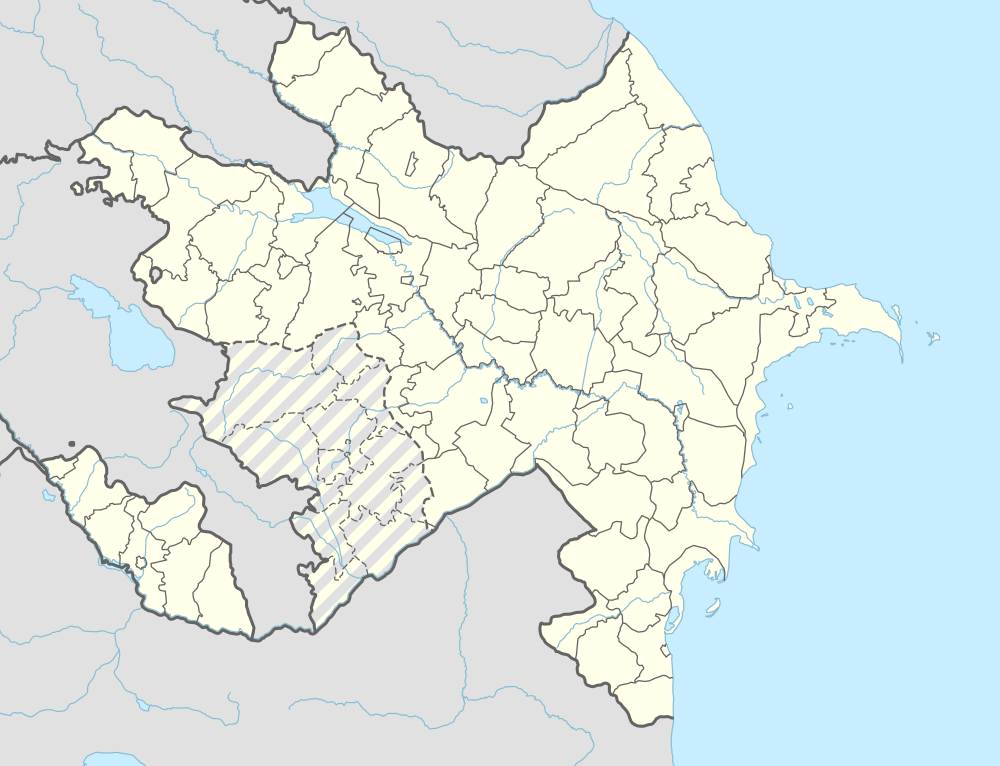Havuş
| Havuş | |
|---|---|
| Municipality | |
 Havuş | |
| Coordinates: 39°36′06″N 45°14′34″E / 39.60167°N 45.24278°ECoordinates: 39°36′06″N 45°14′34″E / 39.60167°N 45.24278°E | |
| Country |
|
| Autonomous republic | Nakhchivan |
| District | Sharur |
| Population (2005) | |
| • Total | 114 |
| Time zone | AZT (UTC+4) |
Havuş (until 2003,[1] Avuş, Avush and Havush) is a village and municipality in the Sharur District of Nakhchivan Autonomous Republic, Azerbaijan. It is located 35 km in the west from the district center, in about 2,000 meters above sea level, on the slope of the Daralayaz ridge, the border with Armenia. There are secondary school, club and a medical center in the village. It has a population of 114. In the its territory are located the settlement of Tamaşalı and cemetery of the Middle Ages.[2]
Etymology
According to some researchers, avuş is a distorted form of the "ağuş" word. In the Persian the word of ağuş means "embrace", "with open arms". As if, the village is so called because it is situated at the foot of Mount Avuş. In fact, the village took its name from the same named spring.[3]
Avuş spring - According to information of local people, the name of the spring is from word of ovuc (the handful), it was so called as the shape it is similar to the handful. In the Turkic languages, avuş/avuj means "vaccine, alum". And this show the existence of the same material in the content of the water of spring.[4]
History
According to official information dated on 1 January 1914, mostly ethnic Tatars (Azerbaijanis), consisting of a total of 346 people in both sexes lived in the Avuş (Russian: Авуши) village of Sharur-Daralayaz uyezd of Erivan Governorate.[5]
In May 1992, a part of the its population have been forced to move to the other villages in associated with the armed aggression by Armenia.[2]
Historical and archaeological monuments
Havuş Maiden's Tower
Havuş Maiden's Tower - the monument on the steepness rocks, in the east of the same named village in the Sharur region. The inside of the rock is consist from the ending of the shaped crown. It is also called among the people the "Maiden House", "Maiden Tower". It is supposed that the monument is belongs to the Middle Ages.[2]
Havuş Necropolis
Havuş Necropolis - an ancient cemetery on the mountain slope near the same named village in the Sharur region. As a result of exploration researches in surface, were collected samples of material culture (especially the pottery fragments). According to the findings, it is supposed that the Havush necropolis is belongs to the II - IV centuries of AD.[2]
Havush Sanctuary
Havush Sanctuary - the cave among the steepness rocks in the north east of the same named village in the Sharur region. Depth is more than 15 m. Width 3, in some places is 4 meters. The Entrance was carved in form of crown-shaped. There are image of several fighters with spears in hand which were engraved with a method of scratching and digging at the inside of the cave. There was carried out the cleaning work in size of 1х1 m, have been found human skeletons at a depth of 40 cm and sharp black arm fracture was found at a depth of 1 m in the cave.The cave is supposed to be an ancient human habitation which later was converted to sacred place is related to the a belief to their ancestors and their the spirits.[2]
References
- ↑ Azerbaijan Parliament - renaming law
- 1 2 3 4 5 ANAS, Azerbaijan National Academy of Sciences (2005). Nakhchivan Encyclopedia. volume I. Baku: ANAS. p. 225. ISBN 5-8066-1468-9.
- ↑ Encyclopedic dictionary of Azerbaijan toponyms. In two volumes. Volume I. p. 304. Baku: "East-West". 2007. ISBN 978-9952-34-155-3.
- ↑ Encyclopedic dictionary of Azerbaijan toponyms. In two volumes. Volume I. p. 304. Baku: "East-West". 2007. ISBN 978-9952-34-155-3.
- ↑ "Кавказский календарь на 1915 год". Издан по распоряжению Наместника его Императорскаго Величиства на Кавказе, под редакцией А.А.Эльзенгера и Н.П.Стельмащука, Тифлис. Типография Канцелярии Наместника Е.И.В. на Кавказе, казённый дом. 1914./Оглавление: Глава — Отдел статистический: Список населенных мест Кавказа, стр. 82
.svg.png)